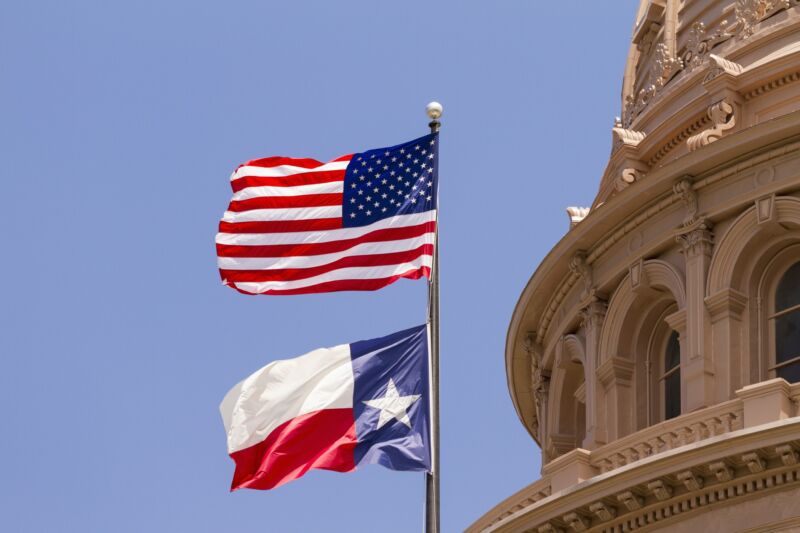Remember the Alamo, forget the Constitution —
Big Tech ready to sue, says ban on social media “censorship” violates 1st Amendment.
Jon Brodkin
–

Enlarge / US and Texas flags flying outside the Texas State Capitol building in Austin.
Getty Images | PA Thompson
Texas Governor Greg Abbott yesterday signed a ban on social media “censorship” into law, imposing new restrictions on tech companies that are certain to spark a court battle similar to one happening in Florida.
Industry groups slammed the newly enacted legislation as “unconstitutional.” The law “seeks to punish social media companies for following policies that protect Internet users from dangerous content online,” according to the Computer & Communications Industry Association (CCIA).
The CCIA previously sued Florida to block a state law that would have made it illegal for social media companies to ban politicians. US District Judge Robert Hinkle sided with the tech industry in June, granting a preliminary injunction that blocks the law because it violates the First Amendment rights of companies that moderate user content on their online platforms.
“Unconstitutional and dangerous”
NetChoice, which sued Florida along with the CCIA, called the Texas law “unconstitutional and dangerous.”
“This bill abandons conservative values, violates the First Amendment, and forces websites to host obscene, antisemitic, racist, hateful, and otherwise awful content… By empowering the government to control online speech, HB 20 clearly violates the First Amendment,” NetChoice President Steve DelBianco said. “This law essentially creates a new Fairness Doctrine for the Internet which will only make it harder for conservatives to share their news and views online.”
The law only lets social networks ban hate speech if it involves “specific threats of violence.”
DelBianco said the Texas law “has the same First Amendment flaws as the Florida law that a federal court blocked this summer” and predicted that the “same outcome will almost certainly occur in Texas.” If it isn’t blocked by a court, the Texas law is slated to take effect on December 2.
The Chamber of Progress, a recently formed industry lobby group, said the Texas law “prohibits social media companies from removing content based on the ‘viewpoint’ of the user—even if that content violates the platform’s community standards. During debate last week, Texas Democrats offered amendments that would explicitly allow social media platforms to take down posts related to Holocaust denial, domestic and international terrorism, and vaccine disinformation. Republicans succeeded in defeating all three.”
The law will “put more hate speech, scams, terrorist content, and misinformation online, when most people want a safer, healthier Internet,” the group said. The lobby group’s members include Facebook, Twitter, Google, Amazon, Apple, and other companies that operate online platforms.
Gov. claims Big Tech censors “conservative viewpoints”
Abbott claimed that the law protects freedom of speech.
“We will always defend the freedom of speech in Texas, which is why I am proud to sign House Bill 20 into law to protect first amendment rights in the Lone Star State,” Abbott said in an announcement. “Social media websites have become our modern-day public square. They are a place for healthy public debate where information should be able to flow freely—but there is a dangerous movement by social media companies to silence conservative viewpoints and ideas. That is wrong, and we will not allow it in Texas.”
The Texas law labels social media platforms as “common carriers” and applies its restrictions to social media platforms with over 50 million active users in the US.
“A social media platform may not censor a user, a user’s expression, or a user’s ability to receive the expression of another person based on: (1) the viewpoint of the user or another person; (2) the viewpoint represented in the user’s expression or another person’s expression; or (3) a user’s geographic location in this state or any part of this state,” the law says.
The bill’s definition of “censor” is “block, ban, remove, deplatform, demonetize, de-boost, restrict, deny equal access or visibility to, or otherwise discriminate against expression.” The Texas attorney general or users can sue social media platforms that violate this ban and win injunctive relief and reimbursement of court costs, the law says.
Law applies to “maximum extent” allowed by Constitution
The law has exceptions allowing companies to censor any post that a “social media platform is specifically authorized to censor by federal law; is the subject of a referral or request from an organization with the purpose of preventing the sexual exploitation of children and protecting survivors of sexual abuse from ongoing harassment; directly incites criminal activity or consists of specific threats of violence targeted against a person or group because of their race, color, disability, religion, national origin or ancestry, age, sex, or status as a peace officer or judge; or is unlawful expression.”
The bill authors seemed to be aware that the Constitution limits how far they can go in regulating online platforms and that courts are likely to strike down parts of the law. “This chapter applies to the maximum extent permitted by the United States Constitution and the laws of the United States but no further than the maximum extent permitted by the United States Constitution and the laws of the United States,” the law says. The law also says that if any part “is found by a court to be invalid or unconstitutional,” the rest of the law shall still apply.
Besides the ban on censorship, the new law says that social media “sites must disclose their content management and moderation policies and implement a complaint and appeals process for content they remove, providing a reason for the removal and a review of their decision,” the governor’s announcement said. “They also must review and remove illegal content within 48 hours. House Bill 20 also prohibits email service providers from impeding the transmission of email messages based on content.”

